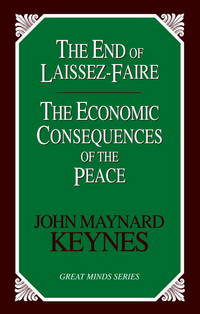
Stock Photo: Cover May Be Different
The End of Laissez-Faire: The Economic Consequences of the Peace Paperback - 2004
by John Maynard Keynes
First line
THE disposition towards public affairs, which we conveniently sum up as Individualism and laissez-faire, drew its sustenance from many different rivulets of thought and springs of feeling.
Details
- Title The End of Laissez-Faire: The Economic Consequences of the Peace
- Author John Maynard Keynes
- Binding Paperback
- Edition [ Edition: Repri
- Pages 298
- Volumes 1
- Language ENG
- Publisher Prometheus Books, Amherst, NY
- Date December 2004
- ISBN 9781591022688 / 1591022681
- Weight 0.73 lbs (0.33 kg)
- Dimensions 7.86 x 5.94 x 0.65 in (19.96 x 15.09 x 1.65 cm)
- Library of Congress Catalog Number 2004020143
- Dewey Decimal Code 330.1
More Copies for Sale

Stock Photo: Cover May Be Different
The End of Laissez-Faire : The Economic Consequences of the Peace
by Keynes, John Maynard
- Used
- Condition
- Used - Good
- ISBN 10 / ISBN 13
- 9781591022688 / 1591022681
- Quantity Available
- 1
- Seller
-
Mishawaka, Indiana, United States
- Item Price
-
$8.78FREE shipping to USA
Show Details
Description:
Prometheus Books, Publishers. Used - Good. Former library book; may include library markings. Used book that is in clean, average condition without any missing pages.
Item Price
$8.78
FREE shipping to USA

Stock Photo: Cover May Be Different
The End of Laissez-Faire: The Economic Consequences of the Peace (Great Minds)
by Keynes, John Maynard
- Used
- Paperback
- Condition
- Used: Good
- Edition
- RE ISSUE
- Binding
- Paperback
- ISBN 10 / ISBN 13
- 9781591022688 / 1591022681
- Quantity Available
- 1
- Seller
-
HOUSTON, Texas, United States
- Item Price
-
$9.13FREE shipping to USA
Show Details
Description:
Prometheus, 2004-12-01. RE ISSUE. paperback. Used: Good.
Item Price
$9.13
FREE shipping to USA

Stock Photo: Cover May Be Different
The End of Laissez-Faire: The Economic Consequences of the Peace (Great Minds)
by Keynes, John Maynard
- Used
- very good
- Paperback
- Condition
- Used - Very Good
- Binding
- Paperback
- ISBN 10 / ISBN 13
- 9781591022688 / 1591022681
- Quantity Available
- 1
- Seller
-
Idaho Falls, Idaho, United States
- Item Price
-
$9.25$5.50 shipping to USA
Show Details
Description:
Prometheus, 2004-12-01. Paperback. Very Good. 8x5x0.
Item Price
$9.25
$5.50
shipping to USA
![The End of Laissez-Faire + The Economic Consequences of the Peace. [paperback].](https://d3525k1ryd2155.cloudfront.net/f/688/022/9781591022688.RH.0.m.jpg)
Stock Photo: Cover May Be Different
The End of Laissez-Faire + The Economic Consequences of the Peace. [paperback].
by Keynes, John Maynard.
- Used
- Paperback
- first
- Condition
- Used - GOOD+. Meager/Scattered underlining in pencil else a VG reading/study copy. Covers lightly scuffed, NO spine creasing.
- Binding
- Paperback
- ISBN 10 / ISBN 13
- 9781591022688 / 1591022681
- Quantity Available
- 1
- Seller
-
Beverly Hills, Florida, United States
- Item Price
-
$15.00$5.00 shipping to USA
Show Details
Description:
Amherst, New York. Prometheus Books. 2004. PAPERBACK. (5.25 x 8.25 inches).. GOOD+. Meager/Scattered underlining in pencil else a VG reading/study copy. Covers lightly scuffed, NO spine creasing. Small octavo. Occasional tables. Footnotes. 298pp. + catalog. Cover art same as Stock Photo. First Edition (THUS). 1st Printing of this edition per print number line. of the Prometheus's Great Minds Series.
Item Price
$15.00
$5.00
shipping to USA